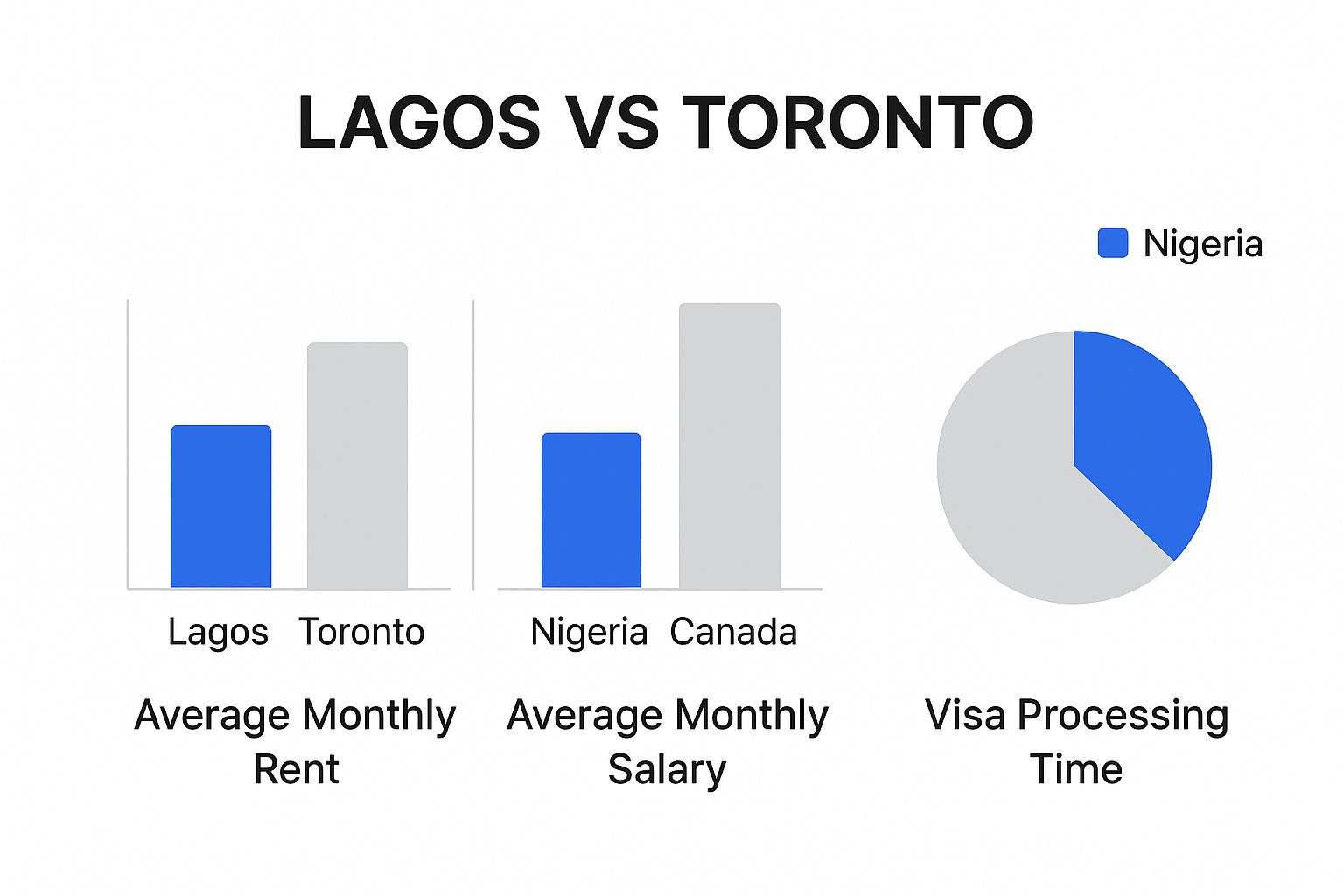How to Relocate to Canada from Nigeria | Expert Guide

Why Nigerians Are Choosing Canada: Beyond the Hype

Relocating from Nigeria to Canada is a significant life decision, influenced by a variety of interconnected factors. It’s more than simply following the “Japa” trend; it represents a deep-seated desire for a brighter future. This includes career advancement, access to better education, and a higher overall quality of life. Let’s explore the key motivations driving this growing migration.
Push and Pull Factors: Understanding the Dynamics
Many Nigerians feel compelled to leave their home country due to push factors, such as economic instability and security concerns. Fluctuating oil prices and high unemployment rates contribute to a climate of financial uncertainty. Furthermore, security challenges in certain regions of Nigeria fuel the desire for a safer, more stable environment. These pressures create a strong impetus to seek opportunities abroad.
However, it is the pull factors associated with Canada that make it a particularly attractive destination. Canada’s stable political system, universal healthcare, and emphasis on education offer a sense of security and opportunity often lacking in Nigeria. This combination is a powerful draw for those seeking stability and personal growth.
This growing interest is reflected in recent immigration statistics. Nigeria has become a major source of immigration to Canada, ranking as the fourth largest source of new permanent residents. In just the first seven months of 2024, 12,280 Nigerians immigrated to Canada, with projections estimating 21,051 by the end of the year. This significant increase is fueled by economic prospects and the pursuit of a better future. For deeper insights into Nigerian immigration to Canada, explore this resource: Nigerian Immigration to Canada.
Cultural Adjustments and Community Building
Moving to a new country always involves cultural adjustments. Nigerian immigrants to Canada often face the challenge of adapting to a new climate, different social norms, and a potentially less familiar cultural landscape. This transition requires resilience and a willingness to embrace new experiences.
Despite these adjustments, Nigerians in Canada have successfully built vibrant and supportive communities. Through these networks, they share experiences, offer guidance, and help each other navigate the complexities of settling into a new country. These communities provide a crucial sense of belonging, easing the transition and fostering a home away from home.
Realistic Expectations: Career, Education, and Quality of Life
While Canada presents numerous opportunities, it’s important to maintain realistic expectations. The Canadian job market, while robust, is competitive. Securing employment in one’s chosen field may require time, additional certifications, or retraining. However, the potential for long-term career growth remains a compelling motivation.
Canada’s education system is highly regarded internationally, providing excellent avenues for personal and professional development. Many Nigerians pursue further education in Canada to enhance their skills and qualifications, viewing this as a crucial step towards achieving their career goals.
The overall quality of life in Canada, including access to healthcare, clean environments, and a safe society, is a major draw. This significant improvement in quality of life fosters a sense of well-being and personal fulfillment. For many Nigerians, it represents a key element of the Canadian dream. In summary, relocating to Canada from Nigeria presents both opportunities and challenges, but for many, the potential benefits significantly outweigh the difficulties.
Mastering Express Entry: The Nigerian Professional’s Gateway

The infographic above offers a snapshot comparing key factors like average rent, salary, and visa processing times between Lagos and Toronto. While living costs in Toronto might be higher, the potential for increased earnings is substantial. This, coupled with quicker processing times, often influences Nigerian professionals considering relocation.
Canada’s Express Entry system is the main route for skilled workers seeking permanent residency. The system manages three core programs: the Federal Skilled Worker Program (FSWP), the Federal Skilled Trades Program (FSTP), and the Canadian Experience Class (CEC). Each program targets different skills and experiences. Understanding these differences is key for Nigerian applicants.
To help illustrate the differences, the table below compares the three Express Entry programs, highlighting key requirements and suitability for Nigerian professionals.
| Program | Primary Requirements | Minimum CRS Score (Recent Draws) | Processing Time | Best For |
|---|---|---|---|---|
| Federal Skilled Worker Program (FSWP) | Skilled work experience, education, language proficiency | Varies, typically above 470 | 6 months | Professionals with significant work experience and strong educational backgrounds |
| Federal Skilled Trades Program (FSTP) | Skilled trade certification, work experience, language proficiency | Varies, typically above 470 | 6 months | Skilled tradespeople with specific certifications and in-demand skills |
| Canadian Experience Class (CEC) | Canadian work experience, language proficiency | Varies, often lower than FSWP/FSTP | 6 months | Individuals with at least one year of skilled work experience in Canada |
As you can see, each program has its own set of requirements and target audience. Understanding these nuances is crucial for Nigerian professionals seeking to relocate to Canada.
Federal Skilled Worker Program (FSWP)
The FSWP is often the best fit for Nigerian professionals with substantial work experience and strong educational credentials. This program emphasizes factors like education, language proficiency in English and/or French, work experience, and adaptability. Accurately documenting these qualifications to meet Canadian standards is vital for success.
Federal Skilled Trades Program (FSTP)
The FSTP caters to skilled tradespeople with specific certifications and relevant work experience. While less common for relocating Nigerian professionals, this program can be suitable for those in in-demand trades. Researching high-demand trades in Canada is crucial.
Canadian Experience Class (CEC)
The CEC is tailored for individuals with Canadian work experience. While not immediately applicable for those coming directly from Nigeria, it’s a valuable pathway to consider for the future. Even temporary Canadian work experience can bolster future permanent residency applications.
The Comprehensive Ranking System (CRS) is central to Express Entry. It assigns points based on factors like age, education, work experience, language skills, and adaptability. A higher CRS score boosts your chances of receiving an Invitation to Apply (ITA) for permanent residency.
Canada actively recruits skilled workers to contribute to its economy. This focus on economic immigration aligns with the aspirations of many Nigerian professionals seeking better career opportunities. In fact, improved career prospects motivate 75% of Nigerian immigrants to Canada. Canada’s Immigration Levels Plan for 2025 aims for 232,150 new permanent residents under economic programs. This reflects Canada’s reliance on skilled immigration for economic growth. Learn more about Canada’s immigration levels plan. Successfully navigating Express Entry requires careful preparation, meticulous documentation, and a solid grasp of the Canadian immigration system.
Your Action Plan: From Lagos to Landing in Canada

Relocating from Nigeria to Canada can seem like a monumental task. This section simplifies the journey by breaking it down into manageable steps, creating a clear action plan specifically designed for Nigerian professionals. We’ll explore key stages, including Educational Credential Assessment (ECA), IELTS preparation, and document authentication, offering practical advice based on the Nigerian context.
Educational Credential Assessment (ECA): Understanding The Nigerian System
The ECA is crucial for demonstrating that your Nigerian educational qualifications are equivalent to Canadian standards. Several designated organizations offer ECA services. Choosing the right one can significantly impact processing time. Because some Nigerian institutions have longer verification periods, this can cause delays. Researching these institutions and choosing an assessor familiar with Nigerian education can be advantageous.
- Choose a designated organization: Research ECA providers recognized by the Canadian government.
- Gather required documents: Typically, this includes transcripts, diplomas, and certificates from your Nigerian institutions.
- Prepare for potential delays: Factor in potential delays due to processing times at Nigerian universities. Starting your ECA early is recommended.
IELTS Mastery: Strategies For Nigerian English Speakers
Demonstrating English language proficiency is essential for Express Entry. The International English Language Testing System (IELTS) is the most common test. While English is Nigeria’s official language, preparing for the IELTS requires specific practice targeted to the exam format.
- Identify areas for improvement: Focus on areas such as pronunciation, grammar, and writing style, which can sometimes present challenges for Nigerian English speakers.
- Practice with real test materials: Familiarize yourself with the IELTS exam format using practice tests and sample questions.
- Consider IELTS preparation courses: Many courses are designed specifically for Nigerian test-takers, addressing common challenges and offering effective strategies.
Document Authentication: Working With Nigerian Authorities
Authenticating your documents with Nigerian authorities is a vital step. This confirms the legitimacy of your educational credentials and other important paperwork. Understanding the procedures and expected timelines in Nigeria is key.
- Contact relevant Nigerian authorities: Identify the specific government bodies responsible for authenticating different types of documents.
- Prepare required documentation: Ensure all necessary documents are compiled and meet the specific requirements of the authenticating authority.
- Allocate sufficient time: Authentication can be time-consuming, so incorporate this into your overall relocation schedule.
Practical Steps: Resignation, Property, and Transition
Beyond official documents, practical matters are also important. Strategically timing your resignation to minimize disruption, managing your property in Nigeria, and coordinating your move all require careful consideration.
- Resignation Strategy: Provide your employer with sufficient notice and ensure a smooth handover of your responsibilities.
- Property Management: Decide whether to rent out, sell, or retain ownership of your property in Nigeria, considering the implications of each option, including ongoing costs.
- Transition Coordination: Meticulously plan your travel logistics, accommodation in Canada, and initial settlement process.
Realistic Timelines and Digital Organization
Realistically, the process, from starting your ECA to arriving in Canada, can take 6-12 months or longer. Creating a digital organization system to track your progress, deadlines, and document submissions is crucial. Checklists, cloud storage solutions, and mobile apps can help streamline your efforts.
For further information on financial planning and managing your proof of funds, see our detailed guide Proof of Funds Canada. This offers specific guidance for Nigerians on currency exchange and required documentation. Also, explore resources on Visa Rejection Reasons to be well-prepared and avoid common pitfalls.
Boosting Your CRS Score: Strategic Moves for Nigerians
Maximizing your Comprehensive Ranking System (CRS) score is essential for a successful Express Entry application to Canada. This section explores proven strategies specifically for Nigerian applicants. We’ll go beyond general advice and delve into tactics that offer the highest impact, based on an analysis of successful Nigerian Express Entry profiles.
Language Proficiency: Timing Your Retests
While language proficiency has been discussed, let’s focus on optimizing your testing strategy. Improving your IELTS score can significantly boost your CRS score. However, simply retaking the test without focused preparation often yields minimal improvement. Strategically timing your retests after dedicated study, concentrating on your weaknesses, maximizes your chances of significant point increases. Focused effort is more effective than multiple, unprepared attempts.
Leveraging Your Nigerian Education
Your Nigerian educational credentials are valuable. Understanding how they translate into the Canadian system is crucial. Obtaining an Educational Credential Assessment (ECA) early in the process is essential due to potential processing times. Be aware of possible delays related to some Nigerian universities. Proactive planning prevents setbacks later.
Additional Credentials: Targeting Point Increases
Further education can strengthen your profile, but not all credentials are equally weighted in the CRS. Instead of pursuing any additional qualification, consider certifications or courses directly relevant to your nominated occupation. These targeted credentials not only improve your CRS score but also enhance your job prospects in Canada, demonstrating a clear career focus.
Provincial Nominee Programs (PNPs): Alternative Pathways
Provincial Nominee Programs (PNPs) offer another route to Canadian permanent residency. Some PNPs are well-suited to the skills and experience of Nigerian professionals. Exploring these programs can create opportunities in provinces actively seeking specific expertise. Success stories of Nigerians using PNP pathways provide valuable insights into the benefits and practical aspects of these alternatives. For example, some provinces prioritize professionals in healthcare and IT, aligning with the experience of many Nigerian applicants.
Benchmark CRS Scores and Planning
Understanding benchmark CRS scores for your profession provides a realistic target. While general CRS information is available, consider your specific situation. Practical worksheets can help you calculate potential point increases from various strategies, enabling you to prioritize the most impactful steps. This targeted approach maximizes your efforts. Finding a job can be challenging; consider exploring online remote job sites for potential opportunities.
Managing your finances is also key. The guide on How to master your proof of funds for Canada offers valuable information on navigating financial requirements for Canadian immigration. A well-structured plan is essential for maximizing your CRS score and navigating the complexities of relocating from Nigeria to Canada.
Financial Planning: The Nigerian Perspective on Canadian Costs

Moving from Nigeria to Canada is exciting, but requires careful financial planning. A Nigeria-specific approach is vital, considering the Naira-to-Canadian Dollar exchange rate and unique expenses often overlooked. This section offers a realistic overview of the financial commitment involved. For further insights, you might find this article helpful: Cost of Relocating from Nigeria to Canada.
Understanding the Exchange Rate: Naira to Dollar
The fluctuating exchange rate between the Nigerian Naira and the Canadian Dollar significantly impacts your budget. It affects everything from visa application fees to initial settlement costs. Regularly monitoring this rate and accounting for potential fluctuations is crucial for accurate budgeting.
Proof of Funds: Meeting Canadian Requirements
Canada requires proof of funds to demonstrate your ability to support yourself and any accompanying family members. Navigating Nigerian banking regulations to meet these requirements can be complex. Understanding acceptable proof of funds and legal asset transfer methods is essential. This typically involves showing sufficient savings in a Canadian bank account or providing equivalent financial documentation.
Unveiling Hidden Costs: What Catches Nigerians by Surprise
Beyond the obvious expenses, several hidden costs can surprise Nigerian immigrants. These include credential assessments, police clearances, medical examinations, and initial setup costs for housing in Canada. Incorporating these often-overlooked expenses will ensure a more accurate and comprehensive budget.
Settlement Budgets: Lagos and Abuja vs. Canadian Cities
The cost of living varies significantly across Canada. Comparing expenses in major Canadian cities like Toronto, Vancouver, and Calgary with those in Lagos and Abuja is crucial for informed decision-making. This comparison helps you choose a city that aligns with your financial resources and desired lifestyle.
To help you understand the financial implications, we’ve created a detailed breakdown of estimated relocation costs:
Relocation Budget: Nigeria to Canada
This table breaks down all major expenses involved in relocating from Nigeria to Canada, with costs in both Canadian dollars and Nigerian Naira.
| Expense Category | Cost (CAD) | Cost (NGN) | Notes for Nigerian Applicants |
|---|---|---|---|
| Visa Application Fees | 1,500 | 750,000 | Includes processing fees and biometric charges. |
| Flight Tickets | 2,000 | 1,000,000 | Round trip estimate; varies based on season and airline. |
| Initial Accommodation | 2,500 | 1,250,000 | First month’s rent and security deposit. |
| Settlement Funds (Proof of Funds) | 15,000 | 7,500,000 | Minimum required for a single applicant; varies with family size. |
| Credential Assessment | 500 | 250,000 | For professional qualifications. |
| Police Clearance Certificate | 100 | 50,000 | Required for immigration purposes. |
| Medical Examination | 200 | 100,000 | Designated physicians required. |
| Miscellaneous Expenses | 1,000 | 500,000 | Includes transportation, food, and other initial setup costs. |
| Total Estimated Cost | 22,800 | 11,400,000 | These figures are estimates and can vary based on individual circumstances. |
Note: Exchange rate used for this table is 500 NGN to 1 CAD for illustrative purposes. Actual rates may vary. Consult a currency converter for the most up-to-date exchange rate.
This table provides a comprehensive overview of the potential costs associated with relocating to Canada. Remember to regularly update these figures with the current exchange rate and adjust them based on your specific needs.
Furthermore, recent immigration trends highlight the importance of proactive planning. The number of Nigerians obtaining Canadian permanent residency saw a 16.6% increase in the year before planned immigration reductions. However, Canada intends to decrease immigration levels from Nigeria and other countries by 21% in 2025 to manage population growth. You can find more detailed statistics here.
Financial Timelines, Banking, and Family Responsibilities
Developing a financial timeline with key expenses and deadlines helps ensure you’re financially prepared. Setting up Canadian bank accounts before arrival and understanding how to manage existing financial obligations in Nigeria while settling in Canada is vital. A clear financial strategy will significantly ease the transition. This often involves managing multiple accounts and potentially transferring funds between countries.
Avoiding Red Flags: Critical Mistakes Nigerian Applicants Make
Relocating to Canada from Nigeria through Express Entry requires meticulous attention to detail. This section identifies critical mistakes that can derail your application, focusing on common pitfalls for Nigerian applicants. By understanding these potential red flags, you can proactively address them and increase your chances of success. Learn from the setbacks of others and avoid making the same errors in your own application.
Documentation Pitfalls: Navigating the Nigerian System
Nigerian applicants often encounter specific challenges related to documentation. The Canadian immigration system places significant emphasis on verifying the authenticity and validity of all submitted documents. Understanding these requirements within the context of the Nigerian system is essential.
Educational Credentials: Ensure your Educational Credential Assessment (ECA) is from a recognized organization and addresses any potential verification delays associated with specific Nigerian institutions. Incomplete or improperly authenticated educational documents are a frequent cause of delays and rejections.
Employment History: Providing clear and consistent documentation of your work experience is crucial. Address any gaps in employment, and ensure your employment letters clearly outline your roles, responsibilities, and duration of employment in a format acceptable to Canadian standards. This includes using company letterhead and providing verifiable contact information.
Financial Documentation: Meeting the proof of funds requirement can be complex for Nigerian applicants due to currency exchange and banking regulations. Clearly document the source of your funds and ensure they are legitimately accessible. Using unofficial exchange channels or providing insufficient documentation can raise red flags.
Verification Issues: Meeting Canadian Scrutiny
Canadian immigration authorities thoroughly scrutinize applications, and verification issues can arise even with accurate documentation. Understanding potential areas of scrutiny will help you proactively address them.
Address Discrepancies: Any inconsistencies between your stated information and supporting documents can lead to delays or rejection. Carefully review your application for any discrepancies and provide clear explanations for any differences. For example, a difference in job titles between your resume and your employment letter should be clarified.
Authenticate Documents Properly: Ensure all your documents, including educational credentials, birth certificates, and marriage certificates, are properly authenticated by the relevant Nigerian authorities. Failure to do so can invalidate your application.
Use Legitimate Immigration Services: Be wary of consultant scams targeting Nigerian applicants. Only use authorized immigration representatives recognized by the Canadian government. Learn more in our article about visa rejection reasons.
Cultural Differences and Communication: Avoiding Misunderstandings
Cultural differences in communication and documentation styles can sometimes lead to misunderstandings. Adapting your application materials to align with Canadian expectations is essential.
Direct and Concise Communication: Canadian communication tends to be direct and concise. Ensure your application materials, including your personal statement and letters of explanation, are clear, focused, and avoid ambiguity.
Formal Documentation: Use formal language and formatting in all your documents. Avoid slang, colloquialisms, and informal abbreviations.
Templates and Examples: Using templates and examples of successful Canadian applications can help you structure your information effectively and present your qualifications in a format that aligns with Canadian expectations.
Addressing Specific Nigerian Challenges
Nigerian applicants may face unique challenges, including delays in obtaining documents from Nigerian institutions and navigating complex currency exchange regulations. Acknowledging and proactively addressing these challenges is essential for a smooth application process. For example, when planning your move, remember to factor in potential costs of living, including options like coworking space cost.
By understanding these potential red flags and taking proactive steps to address them, you can significantly increase your chances of a successful Express Entry application to Canada from Nigeria. Careful planning, meticulous documentation, and clear communication are your keys to success.
Start your relocation journey with confidence. JapaChat, Nigeria’s AI-powered immigration expert, provides personalized guidance and support every step of the way. Explore JapaChat today! and discover how we can help you navigate the complexities of relocating to Canada from Nigeria.

Leave a Reply